I took my first mother-daughter vacation in 2014 to Edinburgh, a year after my father passed away. In the years that followed, my mother, who lives alone in a different city from both her children, would occasionally join us on family holidays. I was content that I was doing my bit, but after spending two years by herself during the pandemic, she reluctantly expressed a desire to travel with just me. She fondly recalled our holiday in the English countryside, where we found ourselves stranded and had to steal apples from someone’s orchard. “I have the best time when I’m alone with you,” she said.
I belong to the original ‘bucket list generation’. Coined in 1999, the phrase is derived from the jovially morbid ‘kicking the bucket’. And so it is that we find ourselves living in an era when exploring the planet has become almost essential to our existence. Everybody we know is fervently planning trips — with partners, children, family and friends. But what about ageing parents who want to take a vacation with their children, to get quality time with them to reconnect? Or the parent left on their own? Who do they plan exciting holidays with, especially if they don’t want to be squeezed into a busy family itinerary?

For the past two years, I’ve made it a point to travel with my 75-year-old mother as often as I can. I do it for her, but also for me. Even as I mother her myself at times, I love being just her daughter, without the demands of motherhood or marriage. Our relationship, I have found during our travels, constantly shifts, alternating between parent and child. Four months ago in Landour, while staying at Devdar Woods, a heritage property, she was the protective one, worrying that a panther might carry me away from the living room of the lodge late at night. Two weeks ago, in Ranthambore, the roles reversed however, when she fell ill, and I found myself mothering her much to her annoyance.
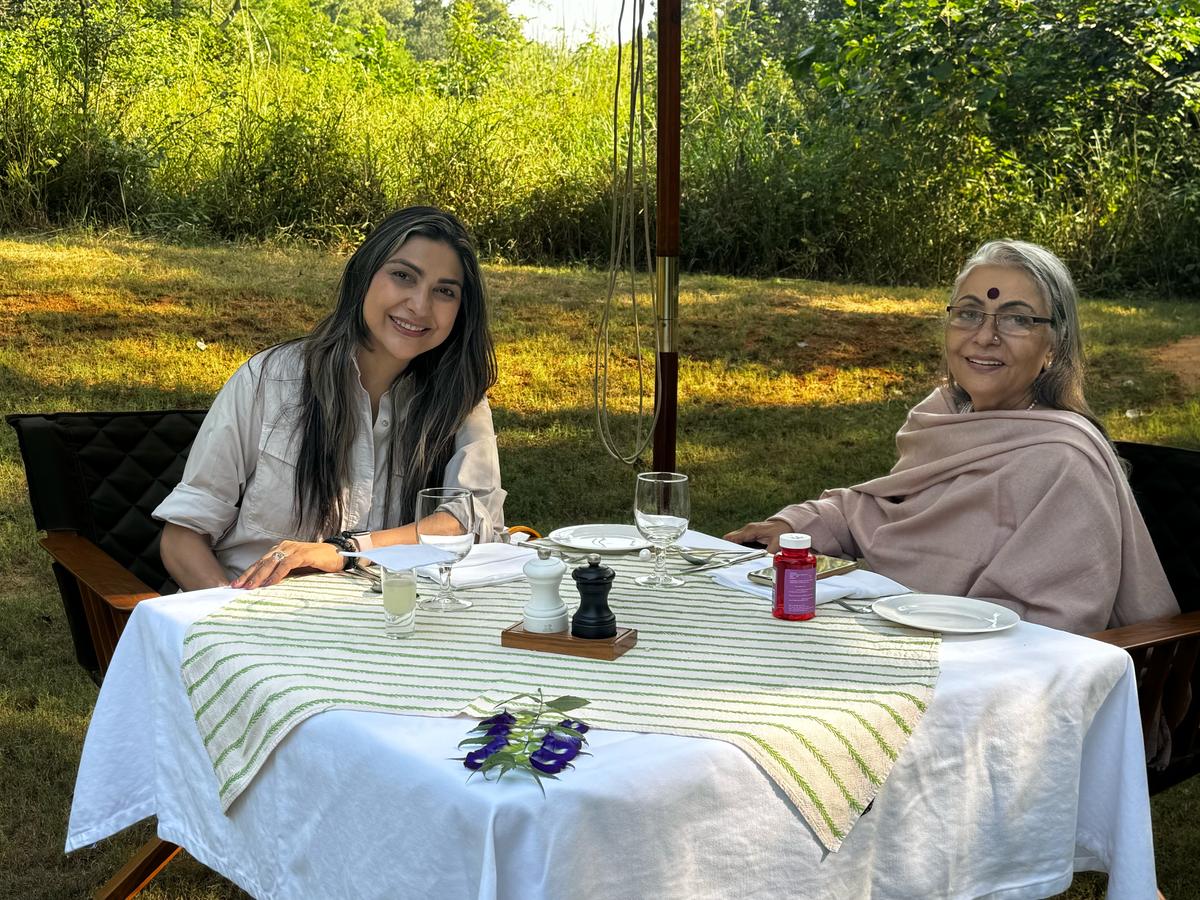
Shunali Khullar Shroff and her mother picnicking at the hotel in Ranthambore
Knowing her love for animals, I’d booked us at Aman-i-Khás, a luxurious tented camp on the edges of the forest, excited for a mother-daughter safari. But on the very first day, she fell ill. And even though she encouraged me to go out alone, it wasn’t what I had planned. Instead of the mother-daughter safari I had envisioned, she spent most of the trip at the resort attended to by Bijai, the butler assigned to our tent while I went on a tiger trail.
When I returned from my exciting excursions, I found her content on the veranda, listening to birdsong. There was not a trace of disappointment — she was eager to hear about my experience. I realised then that the real gift of these trips wasn’t the activities or destinations, but giving all of myself to her. It was our never-ending conversations, she told me later, that sustained her for months.
Time is on your side
In India, life expectancy has improved — from 62.1 years in 2000 to 70.62 years in 2024. With the United Nations Population Fund (UNFPA) projecting that by 2050, the elderly will make up 20.8% of the country’s total population, it’s reason enough to enrich your ageing parent’s life with new experiences. A quick staycation in your hometown is a good place to start.
Discovering unexpected facets
Usha Babur, a Kathak artist who recently relocated from Bengaluru to Dubai, had a similar experience when she took her mother, 74, who lives in Mumbai, on a sightseeing trip to Agra. She’d picked the Holiday Inn for their stay and much of their trip was spent resting at the hotel. “It wasn’t what I’d expected it to be. Mum’s energy levels had decreased, and comfort became the priority,” she says. Babur hired a wheelchair to help her mother avoid standing in long queues at the Taj Mahal, but even then, her mother felt easily exhausted. “Looking back, a laid-back resort holiday would have suited us better than all the sightseeing,” Babur reflects.
Usha Babur at the Taj with her mum
It isn’t just challenges; when you spend time alone with that one parent, you discover so many new qualities in them you hadn’t fully appreciated before. In my mother’s case, I noticed she retains her childlike curiosity, quiet optimism, and a remarkable ability to adapt to change with grace. Babur says, “I realised for the first time how strong my mother had become after my father’s passing.”
Rick Roy, a costume designer from Kolkata, discovered unexpected facets of his mother’s independence on a trip to Mussoorie. She’d just recovered from a prolonged illness and, wanting to take her away from the responsibility of looking after his father and their home in Kolkata, Roy treated her to a stay at the charming Rokeby Manor. “She surprised me by walking out of the hotel alone, saying she wanted to explore. It made me realise how self-sufficient she still is,” he shares. His mother, a painter, had abandoned her art for years, but on this trip, she opened up about it again, sparking something dormant within her.
Rick Roy with his mother
“I don’t want my parents to feel dependent, and letting them plan their travel can empower them. On that holiday, I let my mother decide how she wanted to spend her day,” he says. She came back from the holiday more confident, a glimpse of her old self returning.

“Travelling with your elderly parents beyond a pilgrimage isn’t common. It is a fairly elite trend as it does come at an extra cost to the family, especially when visiting a new destination and booking hotels. But I hope in time more families will find ways to make these experiences possible — whether by choosing closer destinations, planning simpler trips, or travelling off-season.”Jyoti KumariTravel writer
‘Witness to their vulnerabilities’
Yet, not every experience has such idyllic outcomes. Charmine Saluja, a marketing consultant from Mumbai, found her patience tested on a month-long trip to Australia with her mother, 64. “She isn’t digitally savvy and needed help with everything, from Uber to using her credit card,” Saluja admits. “I felt too responsible to relax.” While she appreciated the time together, the trip was a reminder of her mother’s limitations — and of her own boundaries. “In the future, I’d only do it again if all my siblings came along!” she laughs.
Booking their stay at familiar places such as the Hilton or Marriott gave Saluja some respite because she knew her mother was secure and comfortable even while she was away for brief solo excursions during the day. Boundaries and personal space are especially important for parents and their adult children.
“Nothing prepares you for being a witness to one’s parent’s vulnerabilities,” Khadija Masood, a homemaker who lives between Saharanpur and Delhi tells me, as she describes her trip with her father, 72, who lives in Lucknow. They had visited Lakhimpur, a small Uttar Pradesh town where he spent his childhood. “There were no fancy hotels and lunches or exotic sunsets, just me and papa treading back to the place where all of it started,” she says. Masood’s father, a cancer survivor, struggled with the long journey however, making her realise how the roles had reversed.
Khadija Masood and her father
This seems to be a common experience for most people of our generation, a once-confident parent who knew how to take charge now seems shaky at airports and train stations. Yet, watching him entertaining his old friends made her see him in a new light. “The trip changed my outlook overnight,” Masood says. “The safety net that a parent provides is incomparable. But [now I realise] we both need each other, though in a capacity that we have to learn to navigate as we grow.”
Travel writer Jyoti Kumari’s chance trip with her father, 79, to Mahabaleshwar, after her mother backed out last minute, mended their fraught relationship. “I realised how much calmer and more forgiving papa had become,” she says. A temple tour across India followed, and it revealed more facets of his personality. “He went about riling up the priests on purpose,” she laughs. “In Mount Abu, he irritated the Brahma Kumaris with his questions; in Rameswaram, the head priest was ready to curse our entire clan.” Diagnosed with Parkinson’s since, her father no longer takes the lead on trips, but now, even a quiet tea together holds meaning.
Making time to travel
Sudha Mahalingam, 72, has endured a blizzard to visit Lake Issyk-Kul in Kyrgyzstan, gone solo diving in the Great Barrier Reef in Australia, and walked the Camino de Santiago trail in Spain. The travel writer and energy economist has explored over 70 countries while juggling work and caregiving.
Her 76-year-old husband has been living with Parkinson’s Disease for the last 18 years. But being his primary caregiver hasn’t stopped Mahalingam from travelling, as many caregiver spouses are wont to do, and she’s refreshingly honest and guilt-free about her needs. “Travel is my dharma. I have only one life. I don’t know how long my health will hold and I want to travel while I can,” she says, emphasising the need for honest conversations with family. “I told my husband and sons that I didn’t want to be resentful that I had to forego opportunities as a caregiver. If I’m happy, I’ll be a happier caregiver.”
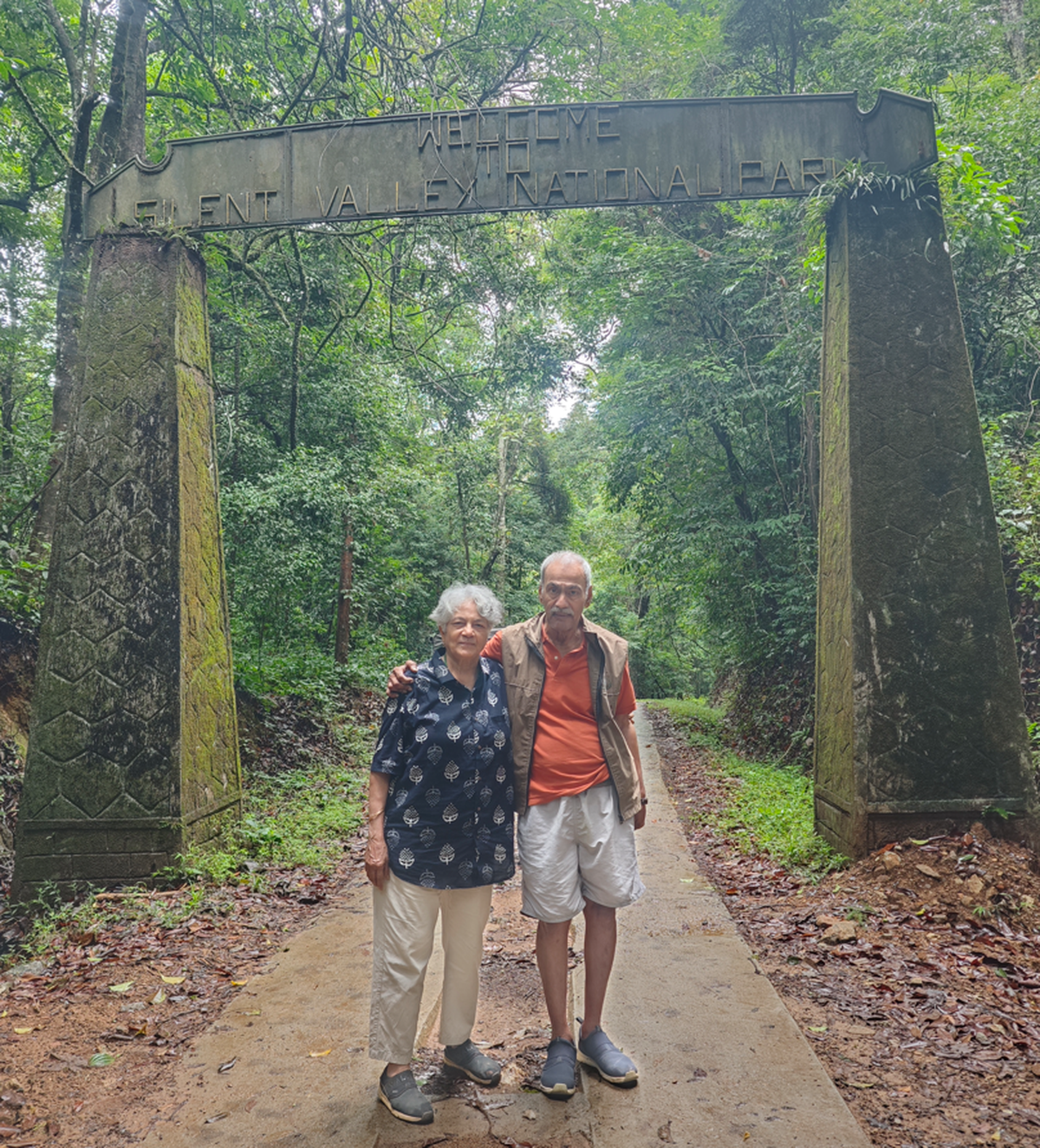
Sudha Mahalingam with her husband at Silent Valley National Park in Kerala
Her sons are supportive, and her husband understands her wanderlust. Mahalingam, on her part, preps as much as possible while away from home — preparing premixed meals, leaving essential contact numbers and her husband’s medication details on a notice board for temporary caregivers, and using a CCTV system linked to her phone to monitor her spouse. If she can’t see him for an hour, she asks a neighbour with key access to check on him.
When one spouse is active and going places, the inactive person can feel bitter. To avoid that, Mahalingam speaks to her husband a few times a day to keep him involved and cheerful. “Modern technology means we can have video calls, so please utilise them,” she advises. She coordinates her longer travel with her son’s visits or requests a relative to supervise. It takes effort but as Mahalingam puts it, the freedom to travel makes for a great reward.
Reshmi Chakraborty
The writer is a freelance journalist and the co-author of Rethink Ageing (2022).
Addicted to experiencing the world
Interestingly, some seniors prefer to travel with friends rather than with their children. G. Kashinath, a 72-year-old from Bengaluru, began travelling extensively after retiring from Unilever. Though he’s travelled with his son’s family, he feels “freer” with people his own age. He’s taken several solo holidays and plenty with friends, but has become a champion for Silver Talkies and Silver Surfers, travel clubs for older people where group sizes rarely exceed 10-12.
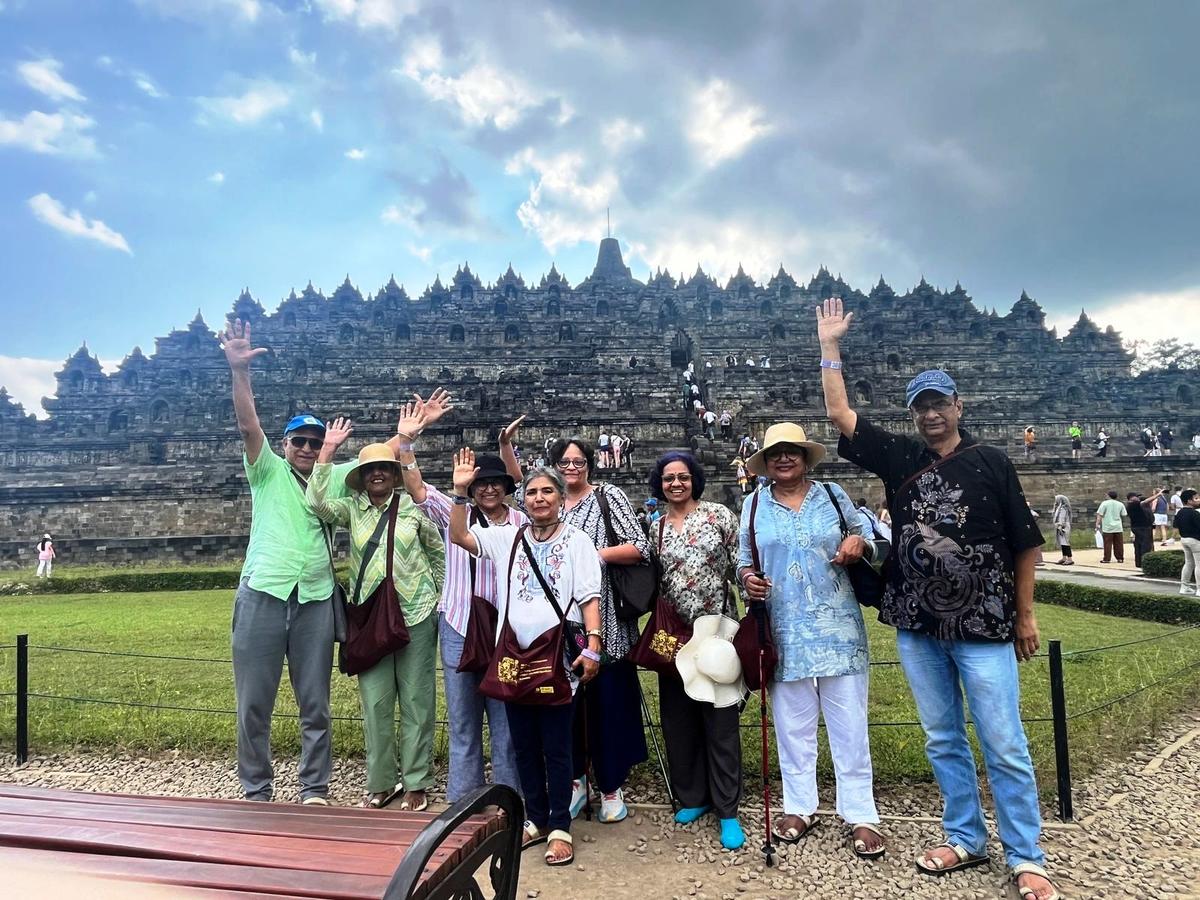
G. Kashinath at Borobudur Temple in Indonesia
“You meet like-minded people and there’s no conflict over food,” he says. “Once, I went to Turkey with a big agency, with 40 people, and we ended up arguing over veg vs. non-veg restaurants. I swore never to do big groups again.” Since then, he’s been to Uzbekistan, Chettinad, Peru, and Indonesia with these clubs, and is looking forward to seeing Varanasi and the Northern Lights in Iceland next.
Travel has also been transformative for Shyju Varkey, a wellness and life coach from Bengaluru, who started going on trips with his mother after his divorce a few years ago. The two recently returned from a trip in Kazakhstan, and have a few more holidays lined up. Travel has helped his mother stay curious and enthusiastic.
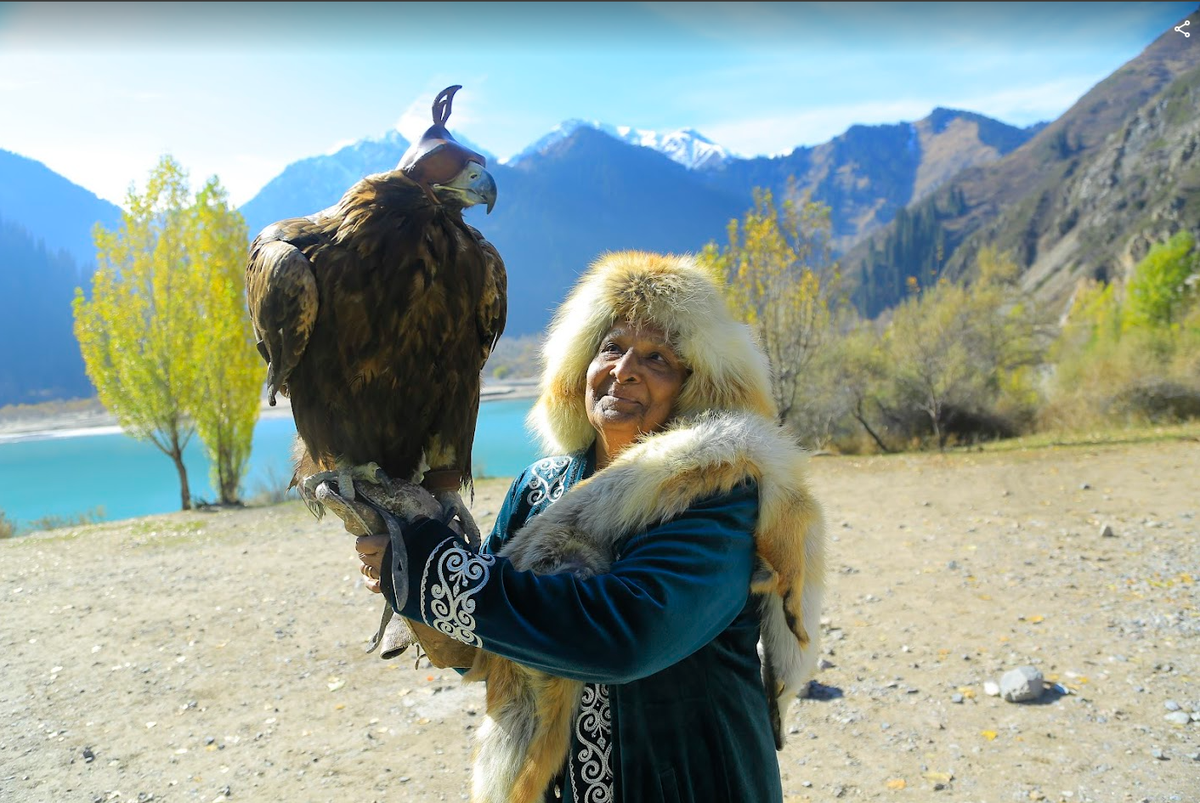
Shyju Varkey’s mum in Almaty, Kazakhstan
Fortunately for them, their holidays have been without incident but there were lessons along the way all the same. “One misadventure was a desert safari in Jaisalmer,” he recalls. “The jeep bounced over dunes, and I worried for her — she’d had a hip replacement the year before and her best friend who was with us on the trip had had a knee replacement!” Still, his mother, now 81, remains so addicted to travel that she has begun planning trips with her friend. The two of them have travelled to the U.S., Canada, Australia, and Singapore, but once there, they rely on their local friends and relatives to look after them.
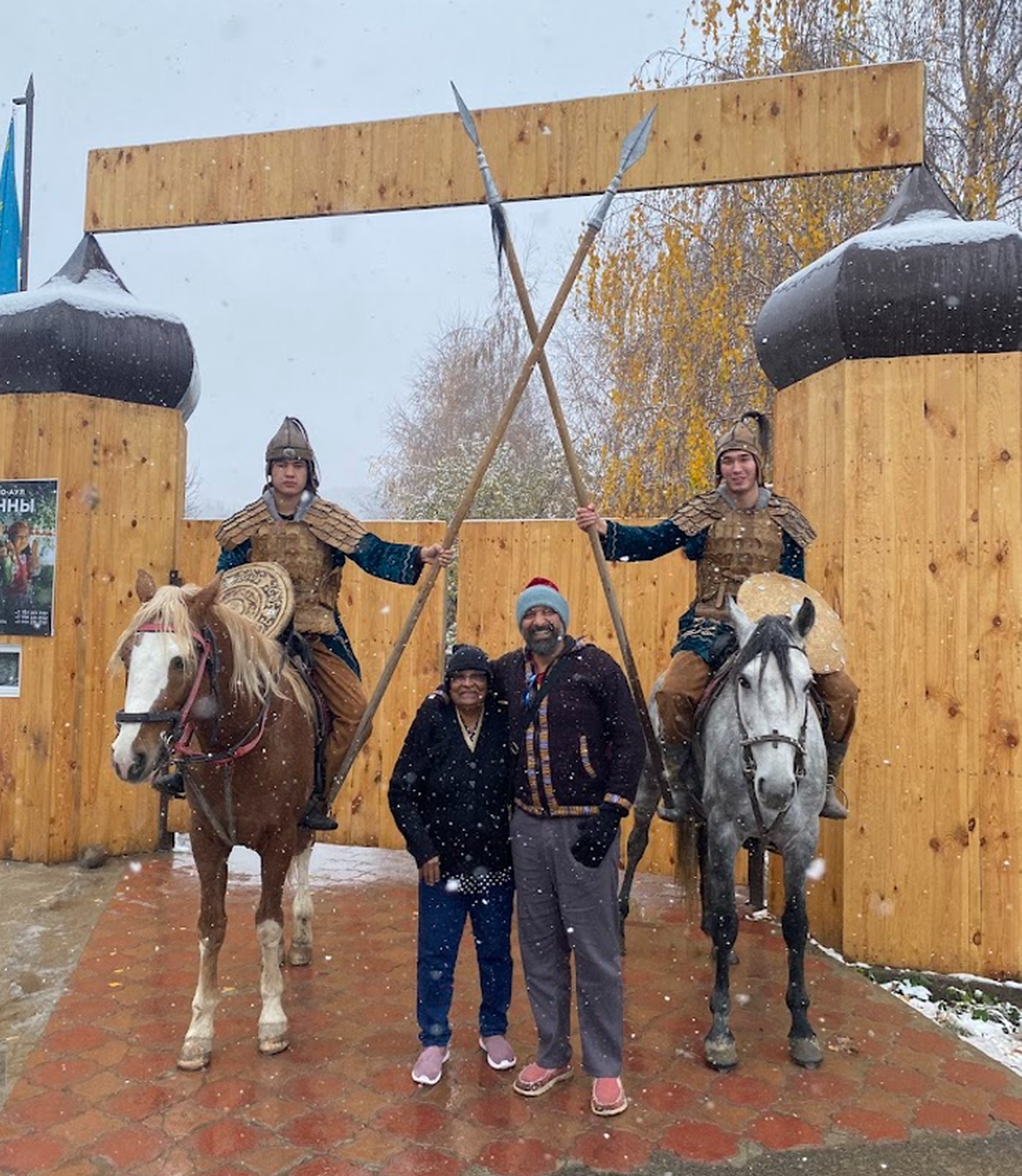
Shyju Varkey and his mum
Only for the economically sound?
For many, holidaying with a single parent is a luxury. “People from middle class families rarely do trips with parents because it is a budget issue,” says Mumbai-based travel agent Ajay Chabbria. “It’s mostly religious trips or family occasions.” Among the elite, however, he has observed that celebrating landmark birthdays with families or an annual destination holiday is emerging as a new trend for some parents. Most of his clients sponsor their parents on a holiday, but don’t accompany them.

“Most people around me do not travel with their parents. But the reason is often that older people don’t want to go beyond their comfort zones, their health may not support them, and most importantly they do not realise what travel can do for them. I don’t believe it’s a budget issue, it’s a mindset issue. Because if people wish to, even in families with lesser disposable income, a trip with a parent can be planned somewhere close.”Shyju VarkeyWellness and life coach
Nearly everyone I spoke to says so far their travels have been without incident, but they all pad up heavily on their parent’s medical insurance.
Sushma Dutta, a general practitioner from Dehradun, acknowledges that travel can work wonders for the emotional well-being of ageing parents. Yet, she notes, a reality for many Indian seniors is that they seldom travel outside family weddings. Dr. Dutta, who mostly has a middle class clientele, observes, “People don’t take their senior parents out even once a month; a vacation is unthinkable. And elderly parents may hesitate to travel with children who tend to get impatient. If you can’t be calm and easy around them, there’s no point in taking them on a trip.”
For Divya Rolla, a project manager at Cult Fit, Bengaluru, holidaying with her parents is a priority, but she takes separate vacations with each of them. “It gives us the space to truly spend quality time together without the distractions of large groups or daily life,” she says. Each parent has different preferences. Rolla has travelled with her father, 74, to Kolkata for food and culture, to Andamans for snorkelling, and to Kenya to witness the migration in the Maasai Mara. With her mother, who is 67, she’s done Coorg home stays and a very special trip to Salzburg. “My mother is a huge fan of The Sound of Music, and wanted to see the place where it was filmed ever since she was a child,” she shares.
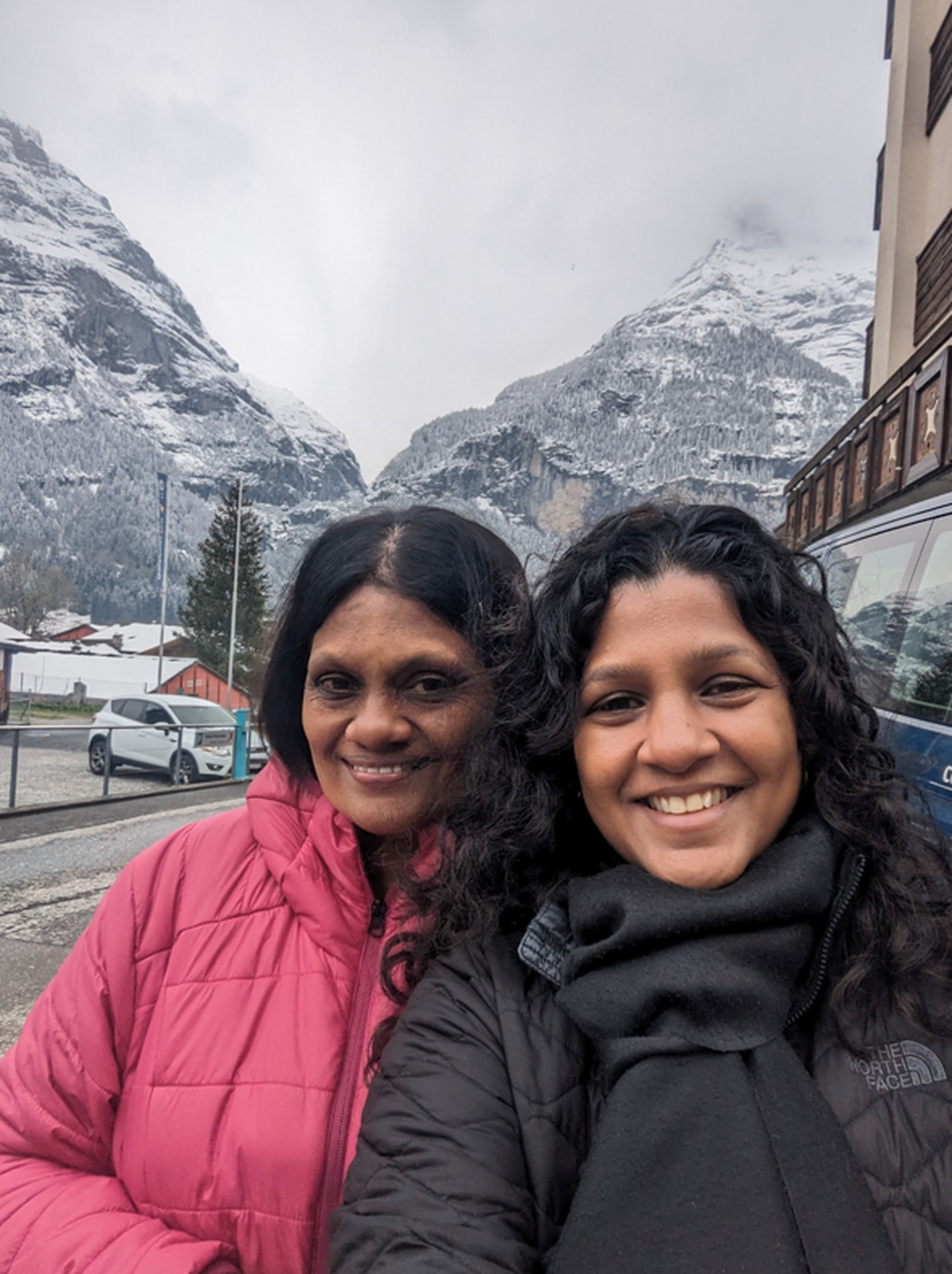
Divya Rolla on holiday with her mother
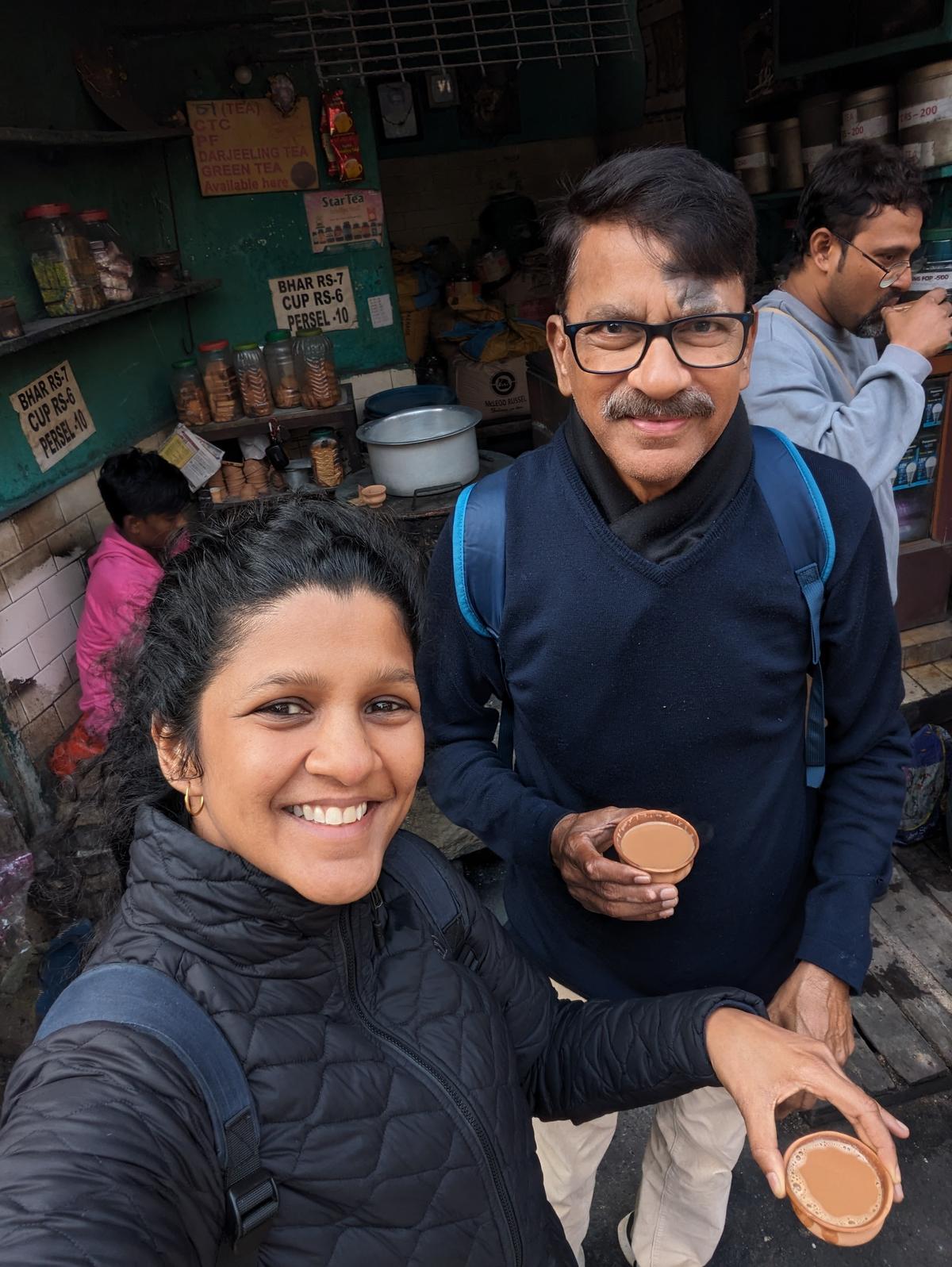
And in Kolkata with her father
Hearing these stories comforted me, affirming that I wasn’t alone in facing complex emotions while travelling with a parent who no longer moves through the world as they once did. I remember that day at the end of our safari holiday, tearing up as I watched my once confident mother walk slowly towards the gate at Jaipur airport. But knowing that despite her unexpected bout of illness, we had created some beautiful memories together brought a smile to my face that carried me home.
20 questions to ask
Planning a trip with ageing parents requires special considerations to ensure their comfort, safety, and enjoyment.
1. What are your parents’ destination preferences?
Consider what your parents enjoy: a peaceful retreat, cultural landmarks, or bustling cities. Choosing a destination that aligns with their interests can make the trip more memorable for them.
2. Is the climate suitable for them?
Extreme weather can affect their health, so prioritise destinations with mild, senior-friendly climates.
3. Are there mobility requirements to consider, based on their health and endurance?
Assess your parents’ physical health and ability to walk or climb stairs before selecting the destination. For places with a lot of walking, consider pacing the itinerary to avoid fatigue.
4. Are local transportation options senior-friendly?
Check if local means of transportation, such as buses and taxis, are accessible for seniors. Look for options with low boarding steps, ramps, or wheelchair access to ensure easy movement.
5. What travel insurance should you get?
Look into options that cover emergency medical assistance, especially if they have pre-existing conditions.
6. Are all necessary documents ready?
Ensure passports, IDs, any necessary medical certificates and travel insurance are in order well in advance. Make copies and keep one set with you and one with your parents, stored in checked and carry-on luggage.
7. Have you consulted a doctor for health advice?
Getting a health check-up or consultation on altitude, climate changes, or dietary advice can prevent health issues while on holiday.
8. What are your parents’ food preferences and dietary restrictions?
Knowing their dietary restrictions (e.g., low sodium, diabetic-friendly) and specific food preferences can help in selecting restaurants or local cuisine options that suit their needs. It may also help to learn some basic terms in the local language to communicate dietary requirements.
9. What medications will they need during the trip?
Prepare a list of daily medications, as well as extras for emergencies. Keep important medications in two places — in a carry-on bag and a checked bag, in case one gets misplaced.
10. Is there an emergency contact plan in place?
Share your itinerary with a family member or friend. List emergency contacts at your destination, including local authorities and nearby hospitals, so help is quickly accessible if needed. Know where the nearest hospitals, clinics, or pharmacies are at each location of your trip. In case of sudden illness, mapping these out will allow you to act fast.
11. Have you chosen hotels with senior-friendly amenities?
Look for hotels with elevators, rooms equipped with walk-in showers, and other senior-friendly amenities. Confirm that the hotel can meet any special needs they may have.
12. What essential items should you pack?
Help your parents pack the right clothes and footwear and items such as sunglasses, caps, sunscreen, umbrella, and raincoat as per the climate and activities planned. Keep backup food items handy, like low-sugar snacks or protein bars, in case suitable food isn’t readily available.
13. Have you booked the most comfortable travel options?
While booking flights or trains, select seats with extra legroom or closer to restrooms to increase comfort. Pre-book wheelchair assistance if necessary to make transit smoother.
During the trip
14. How can you ensure your parents are comfortable during the trip?
Arrange for convenient seating, pre-order senior-friendly meals if available, and take breaks during long car rides to keep them relaxed.
15. Is the itinerary flexible enough to allow for rest?
Avoid packing the schedule too tightly. A balanced itinerary with planned rest periods can prevent fatigue. Keep an eye out for their health and be ready to alter your itinerary as per their comfort and physical stress levels.
16. How can you prioritise hydration and diet?
Keep an eye on hydration, especially if the climate is warm or activities are outdoors. Choose safe, suitable foods to avoid an upset stomach or dietary issues.
17. How will you handle entertainment and activities?
Choose entertainment options that match their energy levels and interests. Cultural performances, leisurely museum visits, or even guided tours are great ways to keep things engaging without being overly strenuous.
Post-trip care
18. Have you accounted for post-travel health recovery?
Older travellers may need a few days to recuperate, so don’t rush them back into their regular routines immediately after the trip.
19. How was their health during the trip?
Take note of any health challenges they encounter. If there were specific difficulties, consult a doctor to address them and prepare for future trips.
20. What feedback do your parents have about the trip?
Ask them what they enjoyed and if there was anything they found challenging. Their feedback can make future travels smoother and more enjoyable.
Nidhi Chawla
The writer is founder and CEO of Silver Talkies (silvertalkies.com), a community for older adults.
The writer is a Mumbai-based author and podcaster.
Published – November 08, 2024 04:25 pm IST
#Parenting #parent #holiday
